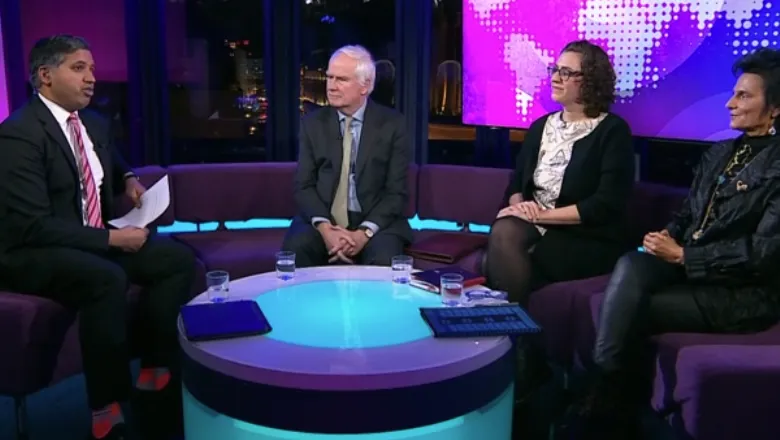In Taiwan, as well as in the Middle East, they are spreading an idea that the US is the worst, bellicose, intervening world leader, they are interfering in Taiwan by arms sales or arms gifts as they may now be, as well as through these visits, promises or visits after the election.
Astrid Nordin, Chair of Chinese International Relations, Lau China Institute
12 January 2024
COMMENT: On the Taiwanese election - 'Ukraine is a parallel to Taiwan'
Astrid Nordin joined experts to discuss China’s threats to Taiwan ahead of the Taiwanese election, and assess global discord between the Global North and South on BBC Newsnight

Speaking to the BBC’s Faisal Islam about China’s narrative towards Taiwan and long-term geopolitical strategy ahead of the Taiwanese elections, Professor Nordin commented,
“We’ve heard already about the narrative that we hear in many parts of the world about the West versus the rest, versus autocracies depending on who you’re speaking to, and the Chinese Government capitalise on this kind of narrative. In Taiwan, as well as in the Middle East, they are spreading an idea that the US is the worst, bellicose, intervening world leader, they are interfering in Taiwan by arms sales or arms gifts as they may now be, as well as through these visits, promises or visits after the election. Whereas China in contrast to that can portray itself as the less bellicose, non-interfering world leader.”
Faisal Islam: The G20 emerging economies are listening to that narrative and for example not listening on the Ukraine-Russia issue, the West has lost lots of the Global South has it not?
Sir Mark Lyall-Grant: “I think it has and the risk is that countries like India and South Africa begin to see Western democracies as leading some sort of campaign which they don’t want to be associated with and in turn, China sees that as an opportunity to pull them away from the post-Second World Wwr rules-based international order, which is so important to our prosperity and security...We’re entering a phase now where for the first time since the Second World War, the ultimate triumph of liberal democracy and market economy can no longer be taken for granted and that is a deep concern.
If you’re sitting in Bejing or Moscow, you’re looking at the Western alliance and you're saying actually there’s a lot of weakness there, there’s a lot of uncertainty, division, polarisation, all these elections coming up and that gives us an opportunity to put forward an alternative narrative.”
On whether China will take this opportunity at what they perceive to be a moment of weakness, Professor Nordin commented,
“I think it’s a long game for China. It’s about narratives, it’s about hearts and minds, its about chipping away at norms that have existed for a long time. We see it in Ukraine [which] is a parallel to Taiwan in the sense that there’s a Chinese narrative that these are fake countries, they’re not really real nations, really real countries and therefore old empires can expand in new ways.”
We see it in Ukraine [which] is a parallel to Taiwan in the sense that there’s a Chinese narrative that these are fake countries, they’re not really real nations, real countries and therefore old empires can expand in new ways.
Professor Astrid Nordin, Lau Chair of Chinese International Relations, Lau China Institute
This article is based on an episode of BBC Newsnight which aired on 12 January 2024 with Astrid Nordin, Lau Chair of Chinese International Relations, King's College London, Nomi Bar-Yacov, Associate Fellow at Chatham House and Sir Mark Lyall-Grant, former National Security Adviser to the UN.
Learn more
For more information about the Lau China Institute visit our website.

